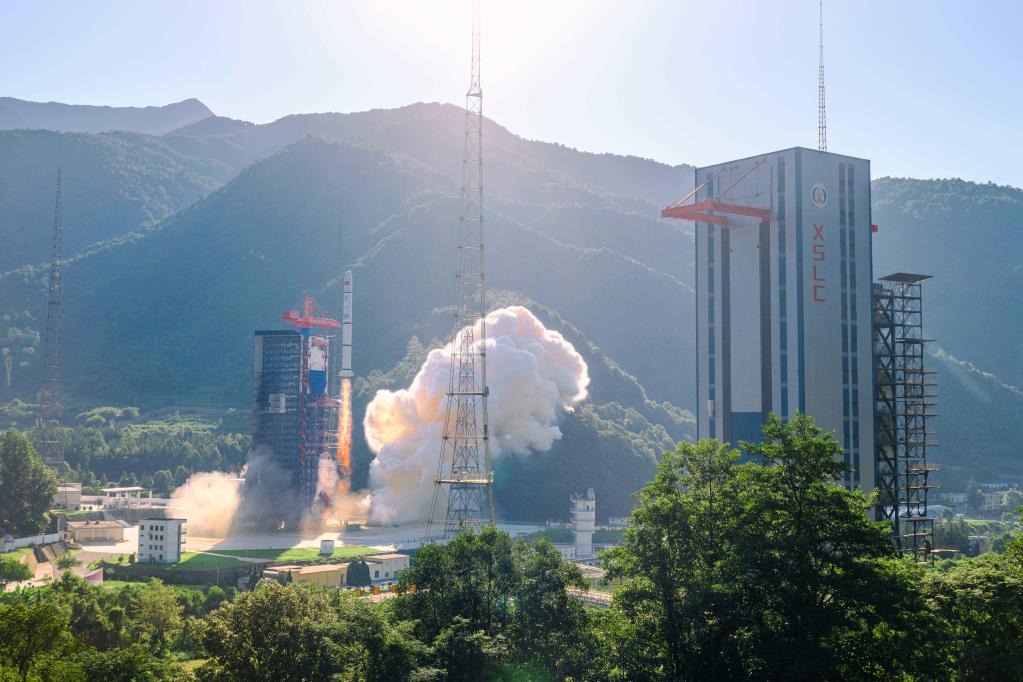China's technological progress to further contribute to space exploration
- By George N. Tzogopoulos
 0 Comment(s)
0 Comment(s) Print
Print E-mail China.org.cn, July 22, 2021
E-mail China.org.cn, July 22, 2021

A critical element in China's 14th Five-Year Plan (2021-2025) is the continuous emphasis on technological advancement in achieving the goal of self-reliance, and progress in space exploration is very much part of this.
Results are not automatic, but stem from long-term planning and hard work. China's lunar exploration program launched back in 2007 has led the country to undertake five missions known as Chang'e, arithmetically numbered from one to five.
A 2016 white paper on space activities clarified Beijing's vision by mentioning its ambition of becoming a space power in all aspects with the capabilities to make innovations independently, to make scientific discovery and research at the cutting edge, to promote strong and sustained economic and social development, to effectively and reliably guarantee national security, to exercise sound and efficient governance, and to carry out mutually beneficial international exchanges and cooperation.
In 2018, Chang'e-4, consisting of a lander, a rover and a relay satellite, managed to successfully land on the far side of the Moon. It was a historic development that allowed original discoveries.
It revealed impressive lunar images and information from a side of the moon not explored by any other space power before. In December 2020, Chang'e-5 concluded China's first ever lunar material retrieving mission.
In recent months, the country again became the epicenter of international attention for its space activity. China is methodically constructing its space station, named Tiangong, or Heavenly Palace. Tianhe module, which will function as the management and control hub of the space station, was launched in the end of April 2021.
Less than two months later, Chinese astronauts were dispatched to Tiangong, their Shenzhou-12 spacecraft docking at the space station. Apart from their technical work, the Chinese astronauts completed a successful spacewalk.
In tandem with Tiangong, China had already managed to send a rover named Zhurong to Mars. Since mid-May, it has thus become only the third country, after the United States and the Soviet Union, to perform this feat in regard to the red planet. The Chinese operation yielded immediate results outlining the potential for new, impressive journeys.
In an environment of uncertainty what remains certain is China's determination to technologically progress – even in areas where it had previously lagged behind. China's miracle now spans the space field.
While China is making solid steps in space activity, it values its cooperation with other countries. It has, on many occasions, reiterated its commitment to the peaceful use of outer space, and pledged to work to promote international cooperation in this regard.
Indeed, international cooperation among space powers should be the answer to the volatility generated by political and ideological disagreements. With joint efforts, more progress could be made in technological innovation in terms of space science and life science, which will help humanity explore the unknown universe.
George N. Tzogopoulos is a columnist with China.org.cn. For more information please visit:
http://www.china.org.cn/opinion/GeorgeNTzogopoulos.htm
Opinion articles reflect the views of their authors, not necessarily those of China.org.cn.
If you would like to contribute, please contact us at opinion@china.org.cn.






Go to Forum >>0 Comment(s)